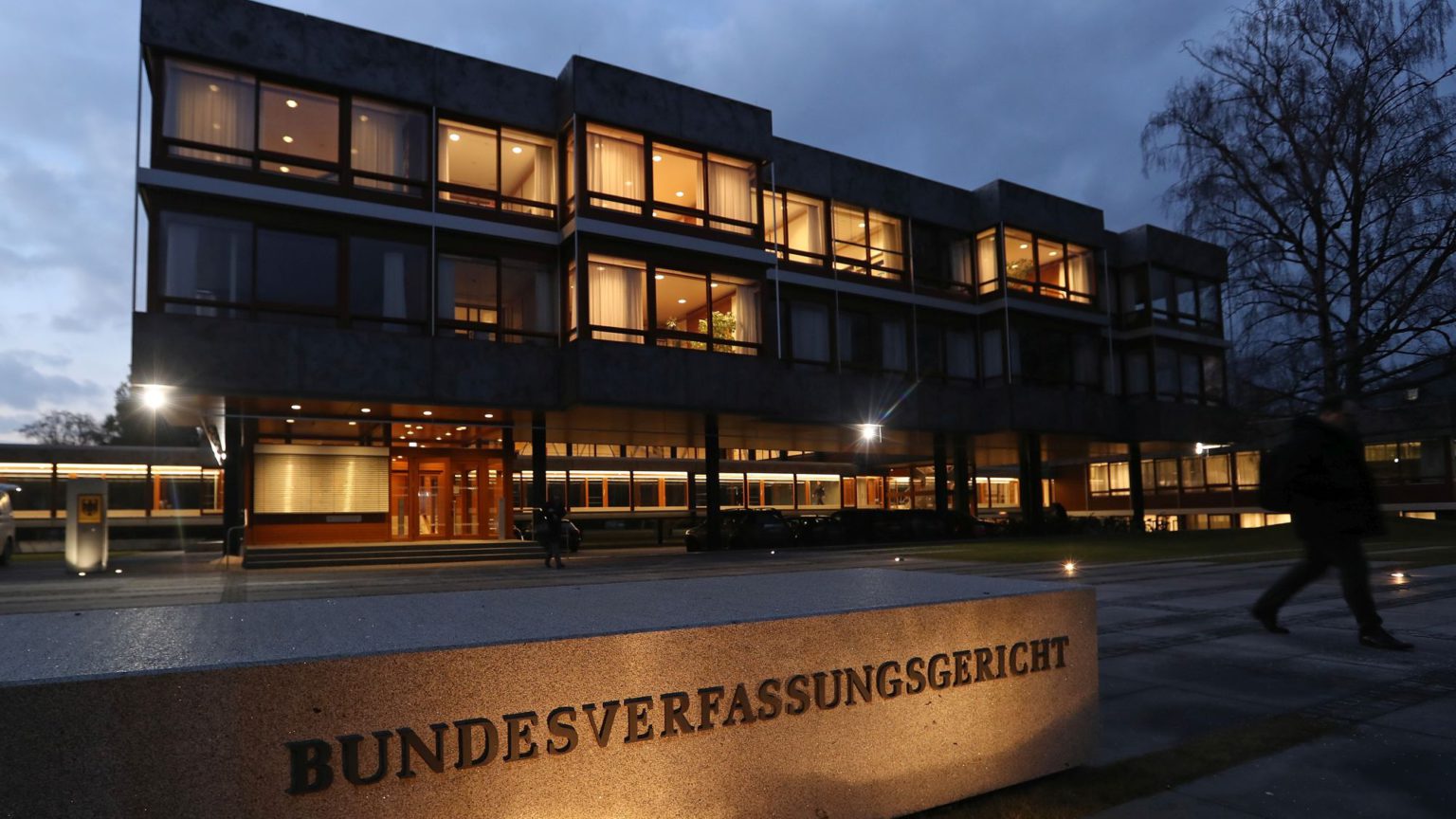The German state’s turn against democracy
In supporting the European banking union, Germany's highest court reveals its anti-democratic heart.

Last week, Germany’s Federal Constitutional Court (Bundesverfassungsgericht) rejected a legal challenge to the European banking union. This union is the means through which the European Central Bank supervises Europe’s larger banks and organises structural funds for banks that fail. The plaintiffs had claimed the ECB’s oversight and liquidation powers were not covered by EU treaties or the German constitution. The court, aligning itself with the German government, concluded otherwise.
After the verdict, I caught up with Markus C Kerber, a professor of public finance and political economy at the Technische Universität of Berlin, and one of the leading plaintiffs in the challenge to the European banking union. He told me the court had lost credibility by siding with the government. ‘If we continue down the road of this ruling’, he said, ‘then it means that in the name of Europe we will have to sacrifice national democracy for centralisation in Brussels’.
Kerber’s right. The banking union rests on a set of unified rules that have transferred responsibility for financial policymaking from national governments to the EU, and strengthened the role of the ECB. It was designed in 2012, and implemented in 2014, as a response to the Eurozone debt crisis, which hit Greece, Ireland and Spain especially hard. It means that the ECB has been responsible for the supervision of all larger banks in the Eurozone, through the single supervisory mechanism (SSM), to use the EU jargon. This system is complemented by the single resolution mechanism (SRM), which promises to ‘ensure the efficient resolution of failing banks with minimal costs to taxpayers and to the real economy’. A third component, still to be fully implemented, is the European deposit insurance system (EDIS) – a centralised fund through which the EU’s bank-deposit guarantee schemes are to be financed.
The wide scope of the banking union is no secret (the pro-EU European Banking Federation (EBF) describes it as an ‘important step towards a genuine Economic and Monetary Union’). In acting as it did, and supporting the banking union, Germany’s highest court has exposed a contradiction between its role as the guardian of the German constitution and its determination to be pro-EU. After all, how does the court square its constitutional role to protect citizens’ democratic rights with its support for a system that moves political responsibility further away from the government and, therefore, from those it claims to represent? Or, as Kerber puts it, ‘there is a rift between the court’s claims [to protect the constitution] and its latest ruling’.
Most importantly, the court’s ruling confirms its disregard for democracy. After all, the banking union, which has also been called a transfer or liability union in Germany (on the grounds that it could potentially move more money from the richer member states to the poorer ones) has never been put to any democratic vote.
Not that the court’s decision to support the banking union should be a surprise. Its support for the EU, even when it undermines Germany’s sovereignty, is longstanding. In 1993, for instance, it rejected a legal challenge, supported and led at the time by the prominent Green politician, Christian Ströbele, against the Maastricht Treaty. Ströbele rightly claimed Maastricht violated basic democratic rights. The court countered that the EU was a union of states but not a state based on a European people. Its powers and tasks were therefore sufficiently defined and limited. Nonetheless, the court cautioned, Germany’s continued membership had to be tied to the condition that ‘legitimation and influence emanating from the people are secured, even within a group of states’.
Similarly ambiguous was its 2009 ruling on the EU’s Lisbon Treaty. ‘The European Unification is a treaty union of sovereign states’, it read. ‘It must not be implemented in such a way that the member states no longer have sufficient room for the shaping of their economic, cultural and social living conditions.’ Nevertheless, the court believed that the requirements of the German constitution – which explicitly states that Germany was to become part of a united Europe – were upheld within the treaty. Democracy was secured, argued the court, if the government sought the support of parliament before agreeing to any law negotiated within the European Council.
Kerber is well aware of what amounts to a gradual outsourcing of sovereignty. ‘Since Maastricht’, he tells me, ‘we have witnessed so many transfers of additional powers to the EU institutions that we are waiting for a ruling hinting at a red line’. Anyone who, like Kerber, hoped the emergence of a banking union would force the court to draw this red line must feel disappointed.
The court was not oblivious to the threat to democracy posed by the banking union. ‘The rules, drawn up after the Eurozone’s financial crisis in 2008 and 2009’, stated the court’s second senate, ‘did indeed raise questions of democratic legitimacy, because the ECB and its local supervisory authorities could act very independently’. But this concern was not enough to turn the court against the government, the EU and, therefore, the status quo.
Are we experiencing a trade-off between economic stability and democratic legitimacy, I ask Kerber? ‘Yes, we are’, he says, ‘and I am unhappy about that. Democracy is more important than European integration.’
Kerber is unsure about what will happen now. Germans, he says, were already feeling the pinch of Brussels’ tutelage. Protest was growing and the AfD was its unfortunate expression. But he feels that, for the time being, the German political establishment is still too addicted to the EU to change tack.
He is not without optimism, however, telling me that hopefully a moderate, liberal, less pro-EU politics might soon emerge. Whether he is right to put his hopes in a more liberal establishment will have to be seen. But, by legally challenging the banking union, Kerber has performed a great service, shedding light on the democratic deficit we are now all facing within the EU.
Sabine Beppler-Spahl’s Brexit – Demokratischer Aufbruch in Großbritannien is out now.
Picture by: Getty.
To enquire about republishing spiked’s content, a right to reply or to request a correction, please contact the managing editor, Viv Regan.









Comments
Want to join the conversation?
Only spiked supporters and patrons, who donate regularly to us, can comment on our articles.